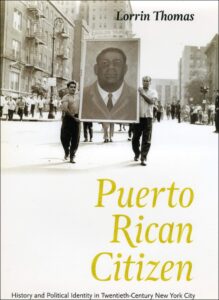Review of Lorrin Thomas, Puerto Rican Citizen: History and Political Identity in Twentieth-Century New York City
Review of Lorrin Thomas, Puerto Rican Citizen: History and Political Identity in Twentieth-Century New York City. University of Chicago Press, 2010
 Lorrin Thomas’s book offers a groundbreaking perspective on the history of Puerto Ricans in New York City, making it an essential read for several compelling reasons.
Lorrin Thomas’s book offers a groundbreaking perspective on the history of Puerto Ricans in New York City, making it an essential read for several compelling reasons.
Firstly, it transcends a narrow, isolated view of this history by placing it within broader contexts. Thomas intricately weaves the Puerto Rican experience into the fabric of New York City, showcasing their interactions and dialogues with Black, Italian, Jewish, and other communities. This approach allows for a richer understanding of their integration into the city’s diverse landscape.
The book connects the narrative to both the island’s political history and New York’s urban and political development. This is particularly vital in highlighting the alliances Puerto Ricans forged with reformers and anti-racists within the city’s diverse “white” establishment and population. By doing so, Thomas underscores that Puerto Ricans were not isolated but had significant allies in their struggles.
Thomas’s work moves away from an “exceptionalist” approach, framing the Puerto Rican experience in a comparative light with other racialized ethnic groups like Italians, African Americans, West Indians, and Asian Americans. This integrated perspective fosters a deeper understanding of their shared and distinct experiences.
The book develops an expanded and nuanced definition of politics and citizenship, which is highly relevant for studying racialized, colonial, and transnational citizens. Thomas integrates formal, informal, racial, organizational, electoral, and radical politics into a single, cohesive framework.
Thomas brings the study of Puerto Ricans into a comparative US race and ethnic frame, engaging in dialogue with works like George Sanchez’s “Becoming Mexican American.” This interdisciplinary approach will foster a valuable dialogue between Puerto Rican and Mexican American histories. She closely reads public dialogues and spaces, mainly through newspapers and organizational exchanges, providing a detailed and vivid portrayal of the era.

The book also contextualizes leaders and leadership, introducing familiar and previously overlooked figures and enriching our understanding of their roles. The author establishes the 1940s and 1950s as pivotal periods in the narrative history of Puerto Ricans, particularly in politics, organizations, and public discourse. The book avoids essentialization, addressing critical issues like colonialism, race, inter-ethnic relations, and the complexity of the community’s politics with sensitivity and depth.
Thomas bridges the gap between the Nuyorican generation of the 1960s and the original second generation of the 1930s and 1940s, highlighting their accomplishments, leadership links, and cultural diversity. The book also recovers the hopefulness and energy of Puerto Rican aspirations, including nationalism, the New Deal, radical politics, and post-WWII reformism.
Furthermore, Thomas reinterprets political “failures” by shifting the focus to a different kind of politics centered on “recognition” and the intrinsic critique Puerto Ricans represented to Liberalism, creating a “flexible paradigm” for future studies.
It also points to future research directions, including histories of communities, movements, housing, labor, socio-economic factors, 1970s-80s radicalism, and the diverse experiences of the Puerto Rican diaspora. It emphasizes the importance of archival collections and oral histories.